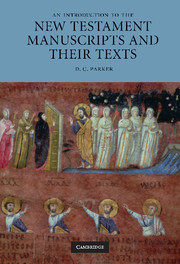Book contents
- Frontmatter
- Contents
- List of plates
- Links to URLs
- Acknowledgements
- List of abbreviations
- Introduction
- PART I THE DOCUMENTS
- PART II TEXTUAL CRITICISM AND EDITIONS
- 4 Manuscripts as tradents of the text
- 5 Textual criticism
- 6 Editions and how to use them
- PART III THE SECTIONS OF THE NEW TESTAMENT
- Glossary
- Index of manuscripts
- Index of biblical citations
- Index of names and subjects
5 - Textual criticism
Published online by Cambridge University Press: 05 June 2012
- Frontmatter
- Contents
- List of plates
- Links to URLs
- Acknowledgements
- List of abbreviations
- Introduction
- PART I THE DOCUMENTS
- PART II TEXTUAL CRITICISM AND EDITIONS
- 4 Manuscripts as tradents of the text
- 5 Textual criticism
- 6 Editions and how to use them
- PART III THE SECTIONS OF THE NEW TESTAMENT
- Glossary
- Index of manuscripts
- Index of biblical citations
- Index of names and subjects
Summary
TWO HUNDRED YEARS OF TEXTUAL CRITICISM
Introduction to the topic
The essence of textual criticism is easily understood. It was present in the definition of variant readings in the introduction. Textual criticism is the analysis of variant readings in order to determine in what sequence they arose. A variant reading is one of four kinds of difference, expressed by comparing the text of one witness with that in one or more others:
addition (strictly, the presence of text in one witness or more which is absent in one or more other witnesses)
omission (strictly, the absence in one witness or more of text which is present in one or more other witnesses)
substitution (a word or words different from those found in one or more other witnesses)
difference in the order of the same words
One or more of these conditions can and does occur at once when a number of witnesses differ at a single place.
More pressing at this point are questions regarding ways of comparing material in order to determine the relationships between texts. The reader should have noticed by now that there are fewer references to manuscripts and more to texts. Some of the references to manuscripts (although I have tried to eliminate them) may be references to the form of text carried by a manuscript.
- Type
- Chapter
- Information
- An Introduction to the New Testament Manuscripts and their Texts , pp. 159 - 190Publisher: Cambridge University PressPrint publication year: 2008



